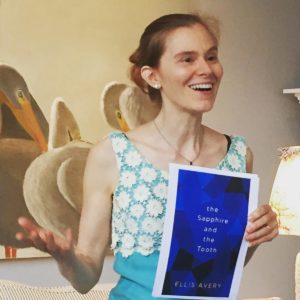On the very first night, one thousand years ago, or… wait, why do we always begin our stories with the first night? There is absolutely no difference between what happened in that distant time and what is happening now. The same columns of men march beneath the sun’s rays in the afternoon’s scorching heat, the same tear-soaked supplications and hymns: “O God, make his grave a green pasture in the gardens of Paradise—don’t cast him into a burning pit of hell.” “O God, grant him a better spouse than the one he has, a better home, and better children.” “O God, forgive his sins and those of your faithful worshippers.”
All posts tagged: 2016
Haphazardia
By MONA MERHI
Translated by NARIMAN YOUSSEF
The sign outside the shop reads, in big dusty letters, Abu Ramy The Lebanese. In a bid for some familiarity amidst the chaos of this neighborhood, I insist we go in.
“Are you Abu Ramy, the Lebanese?”
“At your service.”
Arabic Night at Amherst College
On Friday, April 8, from 6-9 PM, The Common and the Five College Arabic Initiative will co-host the Fifth Annual Arabic Night. The night will feature the launch of The Common‘s eleventh issue, Tajdeed (Renewal), a special issue dedicated solely to translated contemporary Arabic fiction. In addition, the night will feature Professor John Eisele, professor and Director of the Arabic Studies Program at the College of William and Mary, as well as live Arabic music performed by the Layaali Music Ensemble, a Middle Eastern dinner and various student performances.
The Man Who Was Killed
By LUAY HAMZA ABBAS
Translated by YASMEEN HANOOSH
There once was a man who left his home every morning at about six or six-thirty after shaving his face. He sprinkled heavy golden droplets of cologne onto his palm and then patted his cheeks. His cheeks tingled, and he experienced the subtle scent of lemon. The sting and aroma made him feel as if he were passing by a fruit orchard whose scent was dispelled in the air. Next, he put on a clean pair of shoes, one that he had polished as the final chore of the previous day, just before going to bed. He quietly stepped out of the house. In wintertime he encountered the first beams of the rising sun. In summertime, everything was lit already. He picked up a pebble from the sidewalk nearby. He used to choose one carefully, scooping up and inspecting a handful until one special pebble called out to him and his heart was pleased with it. Now he automatically put a pebble in the pocket of his pants, feeling it from time to time. The mute texture gave him comfort, and the solid roundness made him feel that he was carrying something unique and precious, something whose value was not diminished by the fact that it was picked up from the sidewalk.
Profound Surrender: An Interview with Ellis Avery
MELODY NIXON interviews ELLIS AVERY

Ellis Avery is an accomplished author, editor, and teacher. Her first novel, The Teahouse Fire, won a Lambda Literary Award for Lesbian Debut Fiction, a Stonewall Book Award, and an Ohioana Library Award. Her second novel, The Last Nude, also won a Stonewall Award. Avery edits the Public Streets column at Public Books, and writes daily haiku poems on Twitter—a year’s selection of which have been recently published as her first volume of poetry, Broken Rooms.
Au Revoir Akka
By ALA HLEHEL
Translated by ALICE GUTHRIE
The Second Battle
March 26
The women were weirdly dressed: short, revealing, feminine dresses over naval uniform trousers. An attractive French woman was topless, her lower half crammed into a pair of tight military trousers, while some of the soldiers living it up down in the belly of the ship were wearing women’s silk negligees, once bright white but now so heavily stained with vomit, urine, and semen that they were closer to dark grey. On board the Josephine—over the many days of her voyage so far—a professional, serious, and accurate reenactment of some of Sodom and Gomorrah’s wildest days had been performed. Thus the Josephine rocked heavily on the surface of the sea, her cargo consisting of dozens of woozy French women and dozens of French soldiers who were “guarding them,” while the port of Saint Jean d’Acre blinked on the distant horizon.
The Passing Carts
Translated by KATHARINE HALLS
We never had carts, only donkeys that trotted along unencumbered. But my imagination sketched a cart onto every donkey I saw.
I learned to pray facing a well. My grandfather would stand behind me, reciting the words I was to memorize, and scraping at the ground with a stick that was always ready to leap onto my back at the slightest slip. I would repeat his words without mistake.
Limbo, Beirut
Translated by ANNA ZIAJKA STANTON
My Japanese wife Takara told me once that she saw how I turned all things into the substance of a novel. This was fine, she said, but in my relentless pursuit of doing so, I overlooked many aspects of real life.
“The things around us are neutral,” she said. “On an equal plane. We are the ones who raise them up high or bring them down. Disgust is as we define it. Morality is as we define it too. We define right, and we define wrong. We are obsessed with defining everything external to ourselves. Yet this does not mean that we acknowledge what we have defined. Things are by their nature simple, but they coexist within a circle of complex relationships. You, when you write, complicate things and simplify the relationships among them,” she said. “Can you deny it? Even stories that are not trying to provoke social or political changes and are only meant to entertain, most of them simplify the relationships among their characters. Perhaps simplicity in relationships is what we desire in an alternate reality? Even cheap melodramas, we relate to them because they entertain hidden parts of our souls. Do you tell stories to entertain? Is life entertaining, anyway? You do not know? Maybe? No? It is not important. The point is that when you see everything as a story, you are constructing a perfect scene, so you let yourself overlook everything that has no place in your idea of it.”
Disappointments (and a Few Clarifications)
Translated by ANDREW LEBER
1
My life would have been a lot easier if only my grandmother had not been a liar. Or, to put it more nicely, if she hadn’t been so imaginative on that winter night when she convinced me that she would never leave me. If she had informed me that she would die, then I wouldn’t have become so naïve. I’m not sure my story is all that important, or whether I even have a story in the first place—at the end of it all, I stand a defeated woman, one who has faced disappointment again and again. But that’s not important now. The important thing is how that woman spoiled me completely.
Yunus on the Beach
Translated by WILLIAM M. HUTCHINS
The world was still, and Yunus felt alone in existence. He walked along the shore beneath a sky studded with stars. It was his birthday, and he was finally returning home, after his drinking buddies had departed one by one. What was the essence of his solitude? A void and waiting… waiting for what? The end that no one can escape. All he could hope for was that the end be without pain or suffering, as if he were sleeping, roaming the seashore, leafing through a book, listening to one of his favorite symphonies, lost in thought, or recalling memories from his happy past.








